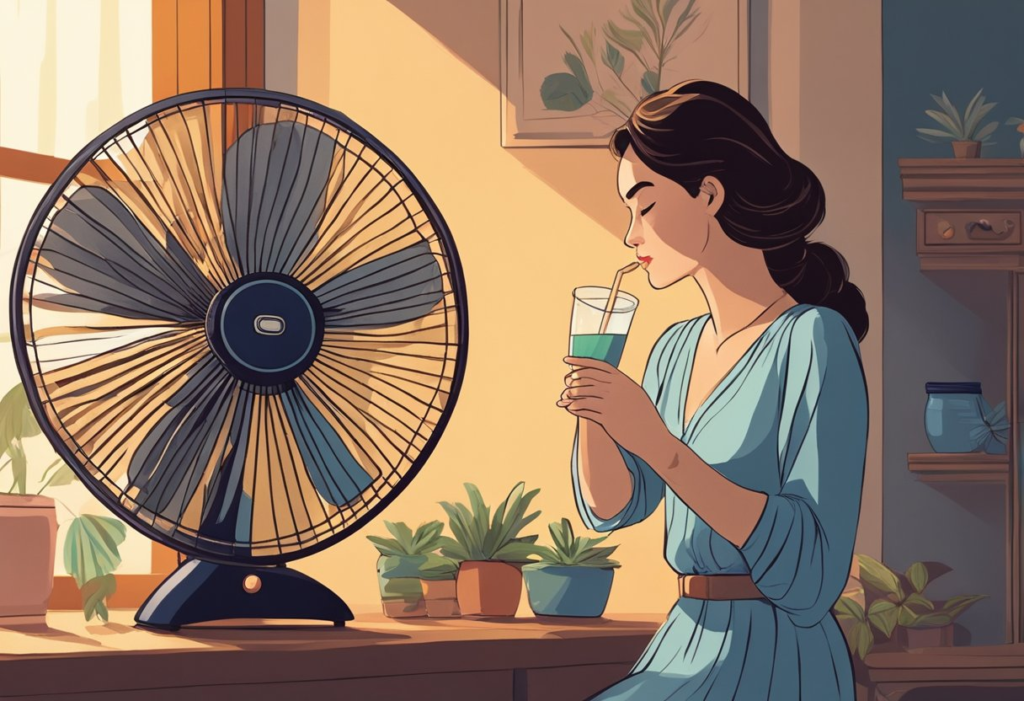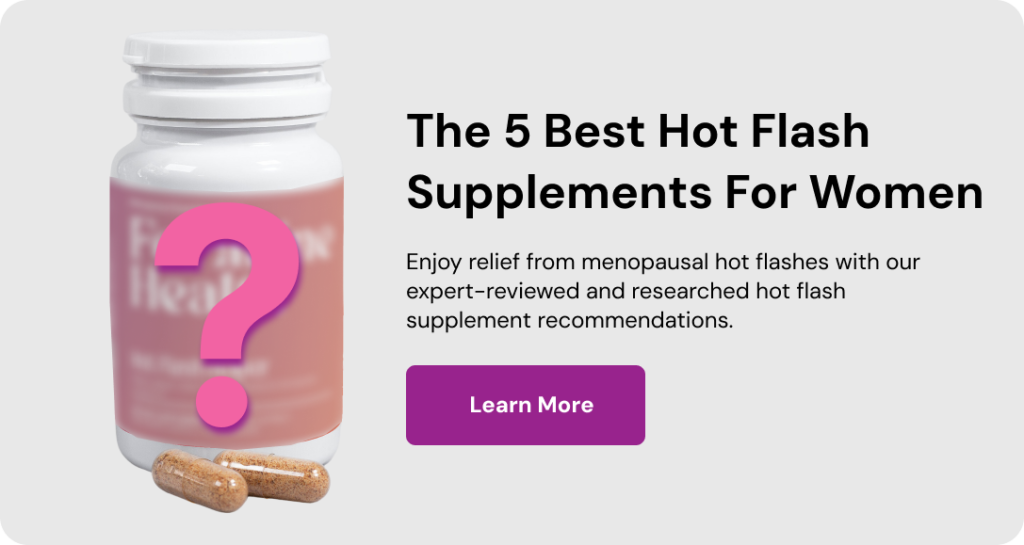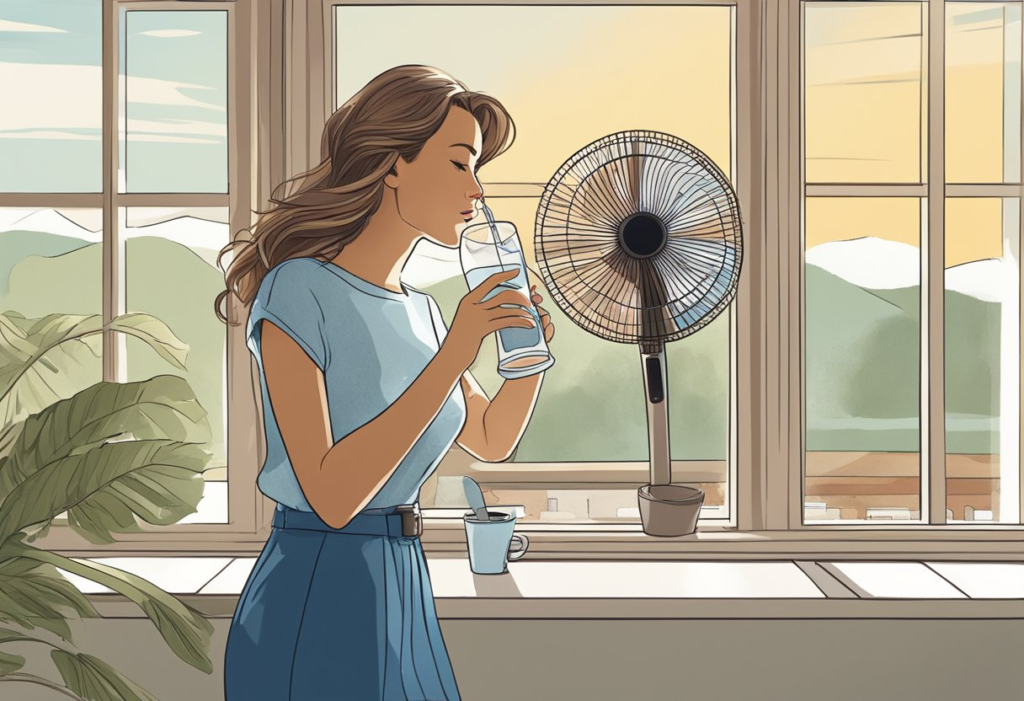Hot flashes can be downright unbearable. If you’ve ever felt that sudden rush of heat, sweating, and heart palpitations, you’re not alone. Many people, especially those undergoing menopause, deal with these overwhelming sensations daily. I’ve put together a guide to help you get immediate relief and restore your comfort:
- Proven techniques to stop hot flashes fast
- Understanding hot flashes to identify triggers and patterns
- Immediate relief techniques for fast results
- Dietary and lifestyle changes to prevent future hot flashes
Understanding Hot Flashes
We experience hot flashes as a sudden feeling of warmth in the body, which is often accompanied by other symptoms. Understanding these symptoms, the link to menopause, and common triggers can help us manage their effects better.
Hot flashes are a sudden sensation of heat, often accompanied by sweating and a rapid heartbeat. A common experience during menopause, hot flashes can range from mild to severe, sometimes disrupting daily activities and sleep patterns.

What Causes Hot Flashes?
The primary cause of hot flashes is the fluctuating levels of estrogen during menopause. This hormonal imbalance affects the body’s ability to regulate temperature. While menopause is the most common trigger, other factors like stress, certain medications, and lifestyle choices can also cause hot flashes.
 Our experts reviewed of 30 hot flash supplements. Now they’re sharing their top 5 recommendations.
Our experts reviewed of 30 hot flash supplements. Now they’re sharing their top 5 recommendations.Identifying Symptoms
Recognizing the onset of a hot flash can help you manage them more effectively. Symptoms include:
- Sudden warmth: A rapid rise in body temperature impacting the chest, neck, and face.
- Sweating: Often followed by a cold, clammy sweat.
- Flushed skin: Redness in the affected areas.
- Rapid heartbeat: A feeling of your heart racing.
Understanding these triggers and symptoms lays the groundwork for managing hot flashes effectively.
When a hot flash strikes, the goal is quick relief. Fast-acting strategies can mitigate discomfort and restore your sense of balance.
Cooling Strategies
- Cool compresses: Applying a cool, damp cloth to the back of your neck can lower your body temperature quickly.
- Cold water: Sipping ice-cold water when you feel a hot flash coming on can reduce its intensity.
- Temperature control: Lower the thermostat or use a fan to keep your environment cool.
Breathing Exercises
Practicing deep breathing can help manage the physical and psychological aspects of a hot flash.
- Deep, slow breaths: Deep breathing exercises can help calm your body. Try inhaling slowly through your nose for a count of four, holding for a count of four, and exhaling through your mouth for a count of four.
- Mindfulness meditation: Focused breathing helps manage stress, potentially reducing the severity and frequency of hot flashes.
Dietary Adjustments
What you eat can significantly impact the frequency and severity of hot flashes. Making conscious dietary changes can offer faster relief and long-term benefits.
Foods to Avoid
Certain foods have been linked to triggering hot flashes:
- Spicy foods: These can increase body temperature and trigger hot flashes.
- Caffeine: Found in coffee, tea, and some sodas, caffeine can exacerbate hot flashes.
- Alcohol: Alcoholic beverages can trigger hot flashes in some individuals.
Beneficial Foods
Including these foods in your diet can help reduce hot flashes:
- Soy products: Soy contains phytoestrogens, which can help balance hormone levels.
- Omega-3 fatty acids: Found in fish and flaxseeds, these nutrients can offer relief.
- Fruits and vegetables: Rich in nutrients, they can help regulate body temperature. For more information, see 12 Effective Natural Remedies for Vaginal Dryness.
Over-the-Counter Solutions
For many, over-the-counter (OTC) medications and supplements provide an accessible way to manage hot flashes swiftly.
Non-Hormonal Medications
OTC options like paroxetine (Brisdelle) offer a non-hormonal approach to reducing hot flashes. It’s a low-dose antidepressant that has shown efficacy in managing symptoms.
Hot Flash Supplements
- Bee Pollen Supplements: Recent studies suggest that around 68-71% of women taking bee pollen experience a reduction of intensity and frequency in Hot Flashes. It’s also found in our top-rated menopause support supplement: Hot Flash Helper.
- Black cohosh: This herb has been traditionally used to relieve menopausal symptoms, including hot flashes.
- Red clover: Contains isoflavones, which mimic estrogen and can help reduce hot flashes.
Feminine Health Products
Our very own Hot Flash Helper offers another over-the-counter solution. This estrogen-free formulation is designed to reduce hot flashes significantly, with some users reporting reductions within a few weeks.
Adopting these immediate relief techniques, making dietary adjustments, and considering OTC solutions can go a long way in helping you manage and stop hot flashes fast.
Note: This guide continues with sections on lifestyle changes for quick relief, stress management techniques, and more, which collectively provide a comprehensive toolkit for addressing hot flashes effectively. Make sure to read on for additional insights and practical advice!
Lifestyle Changes for Quick Relief
Making strategic lifestyle adjustments can offer immediate relief from hot flashes. By incorporating simple changes, you can manage and potentially reduce the frequency of hot flashes.
Temperature Control
- Lower the Thermostat: Keep your living and sleeping environments cool. A fan or air conditioner can be very effective.
- Dress in Layers: Wear lightweight, breathable fabrics. Layering allows you to remove clothing as needed to regulate your body temperature.
- Cold Showers: Taking a cool shower before bed can help lower your body temperature and reduce night sweats.
Sleep Environment
- Optimized Bedding: Use cotton sheets and avoid heavy blankets. Consider cooling pillows and mattress toppers designed to regulate temperature.
- Create a Routine: Maintain a consistent sleep schedule. Limit electronic device use before bed to create a calming environment conducive to sleep.
- Hydrate: Drink a glass of cold water before bed. This simple act can help stabilize your body temperature and prevent overheating during the night.
Integrating these lifestyle changes can help you find fast relief from hot flashes and improve overall comfort.
Stress Management Techniques
Stress can exacerbate hot flashes, making effective stress management crucial. The following methods can help you reduce stress and its impact on your body.
Mindfulness and Meditation
- Deep Breathing: Practice breathing exercises. Slow, deep breaths can calm your mind and reduce the intensity of hot flashes.
- Mindfulness Meditation: Focus on being present in the moment. This practice can diminish stress and decrease the frequency of hot flashes over time. For more detailed interventions, see managing stress-related hot flashes.
- Guided Imagery: Visualize calming scenes or experiences. Guided imagery can be an effective tool for managing stress and its physical manifestations.
Yoga and Tai Chi
- Yoga: Engage in gentle yoga practices. Yoga can reduce tension, improve mood, and help manage hot flashes.
- Tai Chi: This ancient martial art combines gentle movements with breath control. Practicing Tai Chi regularly can improve your relaxation response and mitigate hot flashes.
Relaxation Techniques
- Progressive Muscle Relaxation: Tense and then relax different muscle groups. This technique reduces stress by promoting physical relaxation.
- Soothing Music: Listen to calming music. Music therapy can lower stress levels and provide a diversion from the discomfort of hot flashes.
Incorporating these stress management techniques into your daily routine can help you stop hot flashes fast and maintain emotional well-being.

When to Seek Medical Help
While lifestyle changes and over-the-counter solutions often provide relief, there may be times when additional intervention is necessary. Understanding when to seek medical help can ensure you manage hot flashes effectively.
Identifying Severe Symptoms
- Frequent Hot Flashes: Experiencing hot flashes multiple times a day can be disruptive. Persistent episodes may require medical evaluation.
- Sleep Disruption: Night sweats that significantly interfere with sleep patterns can affect your overall health. Addressing these issues promptly is important.
- Impact on Daily Life: Hot flashes affecting daily activities, social interactions, or work productivity may necessitate professional intervention.
Medical Treatments
- Hormone Therapy: For some, hormone therapy offers significant relief. It involves using medications to balance hormone levels and reduce symptoms.
- Non-Hormonal Medications: Medications such as gabapentin, clonidine, and SSRIs (Selective Serotonin Reuptake Inhibitors) may also help mitigate hot flashes without the use of hormones. For other options, refer to over-the-counter treatments for hot flashes.
Recent Advances
The market has introduced new medications, like fezolinetant, designed to target the brain’s regulation of temperature. Exploring these options with a healthcare provider might offer additional relief for those with severe symptoms.
Conclusion

Effective management of hot flashes involves a combination of immediate relief strategies, dietary adjustments, over-the-counter solutions, lifestyle changes, and stress management techniques. By understanding your triggers and employing these findings from Feminine Health, you can stop hot flashes fast and enhance your quality of life. Remember, being proactive and making thoughtful changes will help you regain control and comfort during this phase.
If you’re interested in finding natural relief from Hot Flashes; Hot Flash Helper can help you combat hot flash intensity and frequency in just a few weeks.